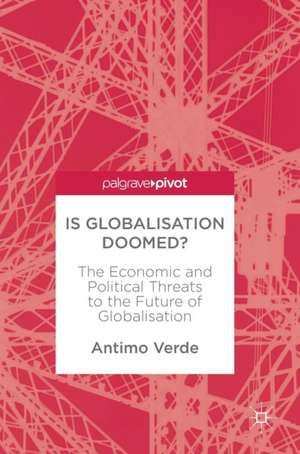Is Globalisation Doomed?: The Economic and Political Threats to the Future of Globalisation
Autor Antimo Verdeen Limba Engleză Hardback – 18 dec 2017
| Toate formatele și edițiile | Preț | Express |
|---|---|---|
| Paperback (1) | 349.67 lei 38-44 zile | |
| Springer International Publishing – 30 aug 2018 | 349.67 lei 38-44 zile | |
| Hardback (1) | 418.83 lei 6-8 săpt. | |
| Springer International Publishing – 18 dec 2017 | 418.83 lei 6-8 săpt. |
Preț: 418.83 lei
Nou
Puncte Express: 628
Preț estimativ în valută:
80.15€ • 82.80$ • 66.71£
80.15€ • 82.80$ • 66.71£
Carte tipărită la comandă
Livrare economică 26 martie-09 aprilie
Preluare comenzi: 021 569.72.76
Specificații
ISBN-13: 9783319585826
ISBN-10: 3319585827
Pagini: 112
Ilustrații: XIX, 150 p. 15 illus.
Dimensiuni: 148 x 210 mm
Greutate: 0.36 kg
Ediția:1st ed. 2017
Editura: Springer International Publishing
Colecția Palgrave Macmillan
Locul publicării:Cham, Switzerland
ISBN-10: 3319585827
Pagini: 112
Ilustrații: XIX, 150 p. 15 illus.
Dimensiuni: 148 x 210 mm
Greutate: 0.36 kg
Ediția:1st ed. 2017
Editura: Springer International Publishing
Colecția Palgrave Macmillan
Locul publicării:Cham, Switzerland
Cuprins
Preface : Why this Book?.- Chapter 1. Globalization Definition and Phases.- Chapter 2. A New Globalization Index.- Chapter 3. Immigration.- Chapter 4. Inequality.- Chapter 5. Terrorism.- Chapter 6. Political Representation.
Notă biografică
Antimo Verde is Associate Professor of International Economics and of Economic Policy at the Tuscia University, Viterbo, Italy and was previously Professor of International Economics at Luiss University, Rome, Italy. He has been a member of the Economic Advisors Group of the Italian Prime Minister and in the Italian Treasury Department. He is the author of many books, articles and papers.
Textul de pe ultima copertă
This book questions whether it is possible for globalization to be reversed and constructs a model for anticipating this potential development in future years. The first part focuses on the preliminary problems of globalization, constructing a model (or index) of its various phases of evolution. It then goes on to consider four problems which represent the principle worries of middles classes when considering globalization: terrorism, inequality, immigration and political representation. It depicts a scenario for the coming years in which globalization may slow down, or fall back altogether, taking care to describe the mechanism whereby either situation would happen.
Caracteristici
Develops a unique model for measuring the development and phases of globalization Constructs an original argument that globalization is reversible Sheds light on complex and topical outcomes of globalization
